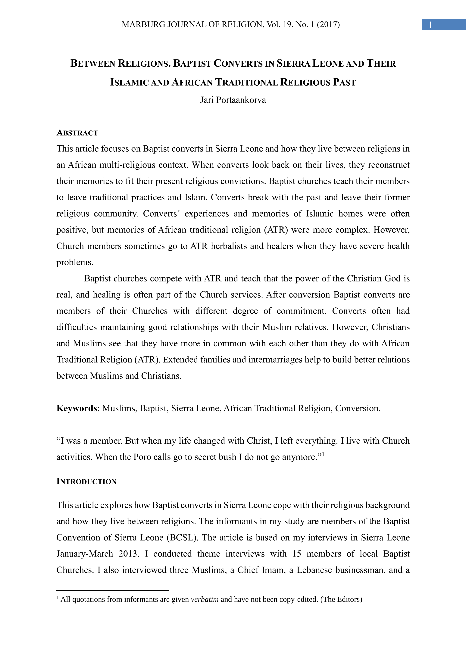Between Religions. Baptist Converts in Sierra Leone and their Islamic and African Traditional Religious Past
This article focuses on Baptist converts in Sierra Leone and how they live between religions in an African multi-religious context. When converts looked back on their lives, they reconstruct their memories to fit their present religious convictions. Baptist churches teach their members to leave trad...
Đã lưu trong:
| Xuất bản năm: | Marburg Journal of Religion |
|---|---|
| Tác giả chính: | |
| Định dạng: | Artikel (Zeitschrift) |
| Ngôn ngữ: | Tiếng Anh |
| Được phát hành: |
Philipps-Universität Marburg
2017
|
| Những chủ đề: | |
| Truy cập trực tuyến: | Truy cập trực tuyến |
| Các nhãn: |
Thêm thẻ
Không có thẻ, Là người đầu tiên thẻ bản ghi này!
|
| Tóm tắt: | This article focuses on Baptist converts in Sierra Leone and how they live between religions in an African multi-religious context. When converts looked back on their lives, they reconstruct their memories to fit their present religious convictions. Baptist churches teach their members to leave traditional practices and Islam. Converts break with the past and leave their former religious community. Converts´ experiences and memories of Islamic homes were often positive, but memories of African traditional religion (ATR) were more complex. However, Church members sometimes go to ATR herbalists and healers when they have severe health problems.Baptist churches compete with ATR and teach that power of Christian God is real, and healing is often part of the Church services. After conversion Baptist converts are members of their Churches with different degree of commitment. Converts often had difficulties in maintaining good relationships with their Muslim relatives. However, Christians and Muslims see that they have more in common with each other than they do with African Traditional Religion (ATR). Extended families and intermarriages helped to build better relations between Muslims and Christians.Keywords: Muslims, Baptist, Sierra Leone, African Traditional Religion, Conversion. |
|---|---|
| DOI: | 10.17192/mjr.2017.19.6306 |
 Publikationsserver
Publikationsserver